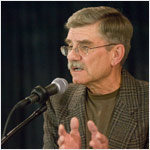Lindsay Goodwin, a communication and journalism major, begins her senior year at St. Thomas this week. She’s smart, sensitive and serious. She’s spent the better part of a year working as an intern with Brad Jacobsen and me on videos for the university. Her dream is to make movies or documentaries, finding some role in telling stories with pictures.
As she plans her exit this year, I got to thinking about a few traits and characteristics I hope she takes with her from St. Thomas when she leaves.
I hope Lindsay leaves with a sense of passion for something. For the engineer, this is the moment when the circuit is completed; for the chemist, the equation is balanced; for the journalist, the story is finished; for the musician, the chorus is repeated. This is when you pump your fist in the air, smile and say to yourself, “I just brought it home.”
I got a taste of that at the University of Wisconsin when I finished a story in a feature writing class about a fishing trip to northern Wisconsin. I used active verbs, colorful nouns and crisp quotes to tell the story about a lake at the end of a logging trail, where bass lurked under fallen trees at the water’s edge, hit top water plugs and danced in the air.
I hope she leaves believing herself a spiritual human being, a tiny part of creation who thinks about her relationship to a higher power. Even at Wisconsin, more secular than spiritual, I discovered a class that made faith appear rational, sound possible, seem sensible. Of course, I promptly ignored the lessons for the next 20 years. But every once in a while, I’d come back to that class, think about “Religion and the Moral Life” and recall what Professor A. Campbell Garnett said:
“I can’t prove God exists. But I can do this. I can tell you there is no conflict, no contradiction between thinking yourself a child of God and being a rational human being.”
I hope she leaves with a sense of history, not only of her own country but that of the world, particularly the Middle East and Africa. When I left Madison, I knew so little about the Arab culture, emerging countries and indigenous people. I’d never seen the Koran, understood European monarchies or examined ancient empires. Now the world is connected on Facebook and LinkedIn. The shirts we buy are made in Bangladesh. Our smart phones are sold in Moscow.
I hope she leaves with a sense of grace, an appreciation for the turn of a phrase, the delicacy of a painting, the intimacy of a sonnet. It doesn’t have to be Shakespeare. The color and candor of a country lyric will do:
With each new day that passes, I’m in need of thicker glasses but it’s all O.K.
Someday I’ll be leaving but I just can’t help believing that it’s not today.
Every golden moment I have found I’ve done my best to run right in the ground.
Tom Waits, Aretha Franklin, Mary Karr. Walter Cronkite, Seamus Heaney, Ringo Starr, Dalai Lama, Charlie Brown. Think I might stick around.
“Earthbound” by Rodney Crowell
And I hope she leaves with a sense of joy and wonder, for the music she’s heard and yet to hear, the people she’s met and yet to know and the places she’s been and yet to see.
She can hear the Christmas Concert and feel the passion and pride of 300 voices on the chorus of “Joy to the World.”
She can hear the wit and wisdom of teachers like sociology professor Buffy Smith, who teaches a course on race and ethnicity. Here’s a teacher, author and researcher who spots a student or colleague walking across campus and says, “Good morning, sir.” Sir? Sir? Then the professor smiles and you know you’re in the presence of a generous spirit.
And she can sit on the library steps on a fall or spring morning, look across the quad and soak in the peace and tranquility as the campus comes awakes.
Hey, Lindsay! Have a good year.







